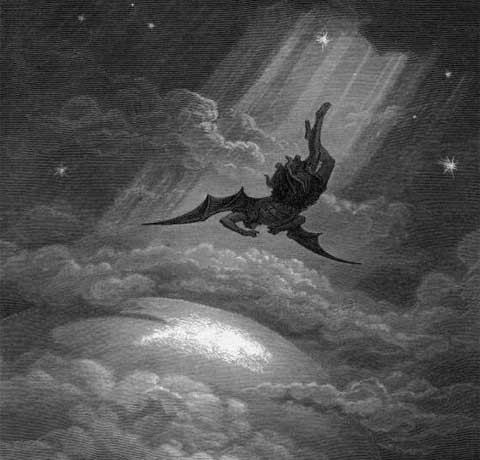
…Just as every cop is a criminal
And all the sinners saints
As heads is tails
Just call me Lucifer
Cause I’m in need of some restraint
So if you meet me
Have some courtesy
Have some sympathy, and some taste
Use all your well-learned politics
Or Ill lay your soul to waste, um yeah…
-----Sympathy for the Devil, Rolling Stones-----
Milton took it upon himself to ‘justify the ways of God to men’ and through I, Lucifer Glen Duncan (Hope, Weathercock) attempts to justify the ways of Lucifer to those interested in the other side of the story. In literature and in popular belief, few have tackled this other side and an endeavour like Duncan’s is bound to be seen as controversial and gimmicky but the novel has enough hilarity in it to rescue itself from both.
‘I, Lucifer, Fallen Angel, Prince of Darkness, Bringer of Light, Ruler of Hell, Lord of the Flies, Father of Lies, Apostate Supreme, Tempter of Mankind, Old Serpent, Prince of This World, Seducer, Accuser, Tormentor, Blasphemer, and without a doubt Best Fuck in the Seen and Unseen Universe (ask Eve, that minx) have decided - oo-la-la! - to tell all.’
These are the opening lines of the novel and are in stark contrast to the start of The Master and Margarita by Mikhail Bulgakov, which features a Satan of an allusive introduction. This David Copperfield sort of launch serves an important purpose as the reader is gripped by the no-nonsense-beating-around-the-bush start. A lot of books and movies about the Devil come to the protagonist’s realm only eventually as it is a touchy subject and a particular upsurge is required to build anxiety in the eyes of the reader. But I, Lucifer doesn’t want to target the mind; it wants to target the soul, the faith of the reader and what better way to go around this than the oo-la-la please-allow-me-to-introduce-myself manner?
The devilish narrator reveals that after his prolonged iniquitous fall, ‘the one with all the special effects’ from God and Heaven, now there’s a new deal on the table. You instantly wonder what deal could this be and what significance it could have for the rest of the world and for the rest of the universe’s fate. You get the picture of a divine Noel Edmonds (and you have to admit he is freakishly Jesusish) sort of bloke saying ‘Deal or no deal?’
The new deal that Gabriel (‘once a carrier pigeon always a carrier pigeon’) brings down to the Satanic Majesty from the Platonic Majesty is that the fallen angel will be given a last chance at redemption, given that he agrees to spend a month in earthly personification without sin. This vacant body belongs to one Declan Gunn (notice the anagram of Glen Duncan?), a writer who is both unsuccessful and on the lip of suicide. Lucifer agrees because till now he has only kept himself busy by creating dark pleasures but has been unable to participate in his sinister creations. And so begins the one month long test-ride of what earth has to offer to and in flesh and blood.
The first few days that Lucifer spends in Declan’s body are run of the mill experiences of the anthromorphic kind. He delights in having his omnipresent and infinite knowledge cocooned in the earthly body as it is a new feeling for him. He starts tasting all that earth has on the menu and to which he had no access to as an angel. Even a fallen one. He revels like a child on the simplest earthly offerings of tastes, drink, sunsets and London. Then he goes from first gear right to the fifth and participates in decadence of a higher degree. Cocaine laced nights, gamboling with girl-escorts, even a homo-sexual encounter with a young boy…he wants to try everything he can.
But the tale is not all of Lucifer’s probation in the human sensorium; responsibility comes in as well. He has to battle with Declan’s dormant conscience and decides to resurrect the writer’s career by re-writing the story of Creation in a film-script format that has Tinsel town kissing his feet. He also rekindles Declan’s love life and also sorts out his relationship with Penelope, his much hated and much missed ex, by seeing her in person and forgiving her for cheating on him.
The novel is quite remarkable for the ventriloquism that Duncan applies to present his own observation of the human condition. What starts as a wise-cracking Lucifer introducing himself as a maverick and rebellious free-thinker and God as a humourless despot, soon turns Lucifer into renovated evil.
Till the present day, Lucifer has justified his grudge against God by using freedom as an issue. He says, ‘the point my dears, is not good nor evil - but freedom. For an angel there is only one true freedom, and that, I'm sad to say, is freedom from God. Freedom is the cause and effect. In this particular Creation, freedom from God (worship of God, dependency on God, obedience to God), is what you're after, then I'm afraid evil's for only the really game in town. What I'd like, what I'd love, is to have been given a nature that didn't even know God - the fish in the pond who doesn't know life beyond it; the lawn, the house, the city, the country, the world...’
This libertarian tone is later lost in the novel when Lucifer’s holiday in flesh sees him pondering freewill, theology and the Fall. He understands the mechanics and reason of God’s universe better in Declan’s human body which was perhaps God’s initial plan. He even contemplates about maybe getting back on God’s good side. But these are just passing thoughts and at the end of his trial month when the Archangels are back to retrieve him, the inhuman Lord wishes to remain human. However, the creator has a trick up His sleeve and the climax is quite exciting.
I, Lucifer is evil personified but personified rather well. Duncan’s prose is quite refreshing and the tone of the protagonist is well driven and subterranean. The language of this devilish monologue is witty and makes reference to all sorts of historical and popular culture events i.e. all the events in which Lucifer was involved. The book shows us the lighter, darker, opinionated, flexible, selfish, self-less, emotional and cold sides of Lucifer all at once and is as such, a must read for any reader who doesn’t mind challenging religion. To those who complain about the book being quite evil, anti-religious and dark all I can say is that it is quite expected of the Prince of Darkness to be dark in his expression. The Devil can quote scriptures to suit his purpose and Glen Duncan is one such devil. The subsequent movie based on the movie is set to release later this year.
Calvin: Do you believe in the Devil? You know a supreme evil dedicated to the temptation, corruption and destruction of man?
Hobbes: I’m not sure man needs the help.
Calvin & Hobbes
Calvin: Do you believe in the Devil? You know a supreme evil dedicated to the temptation, corruption and destruction of man?
Hobbes: I’m not sure man needs the help.
Calvin & Hobbes

No comments:
Post a Comment